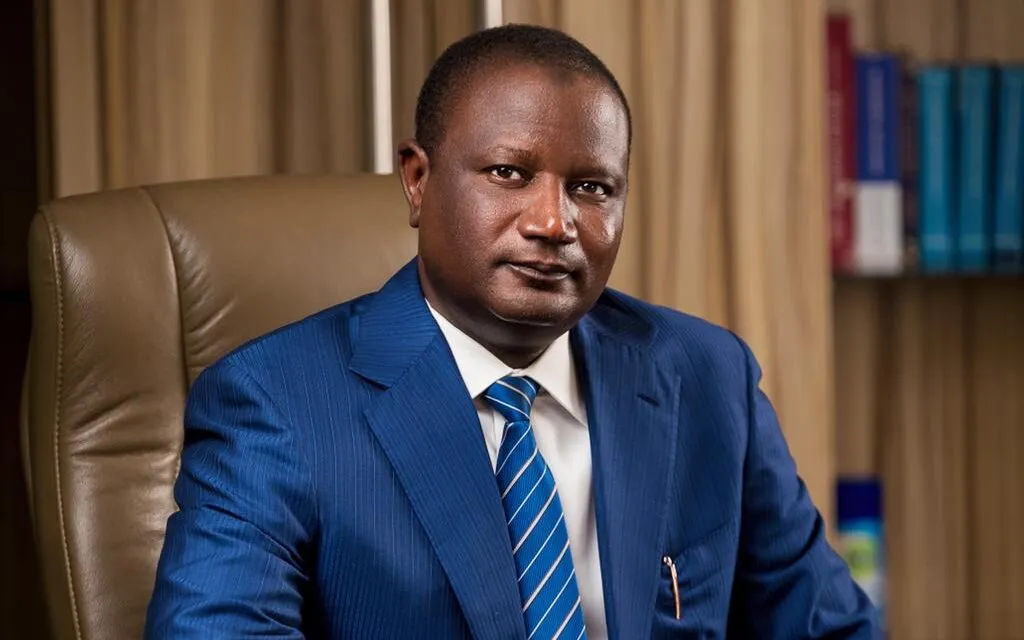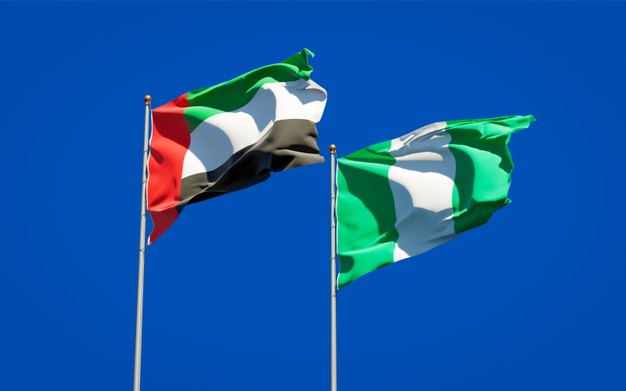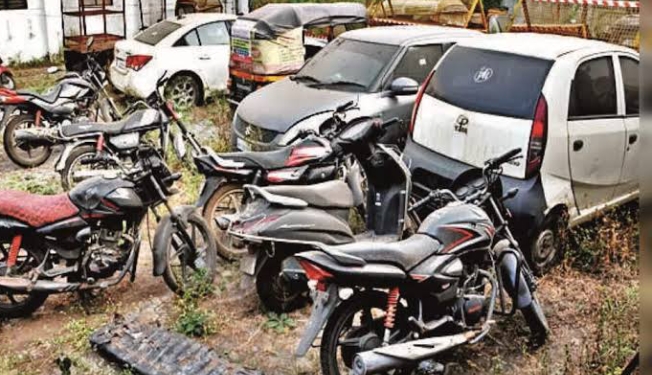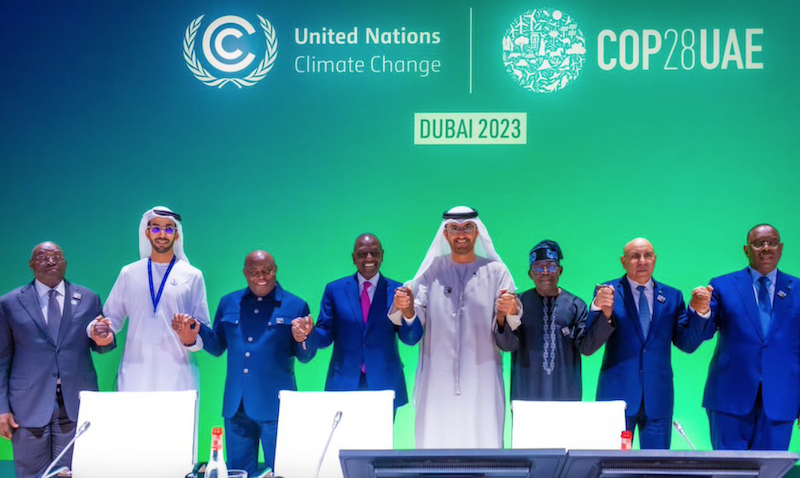Just as flowers are drawn to butterflies, Nigerians are similarly captivated by Dubai, United Arab Emirates (UAE). To the ordinary Nigerian, Dubai embodies a fusion of London, Paris, and the bustling metropolises of New York and Los Angeles.
For many Nigerians, Dubai serves as a quintessential hub of entertainment, particularly for individuals lacking the financial means, visa privileges, or time to venture to other continents like Europe and North America. Dubai, with its amalgamation of pleasure and business infrastructure, symbolizes a comparable experience that might otherwise be inaccessible to those facing constraints in travel resources.
Therefore the convergence of Nigerians in Dubai for the ongoing COP38 extends beyond a typical climate change conference. At this event, the most significant threat to humanity in the current century is under discussion, and over one hundred thousand delegates from 92 countries worldwide, including scientists, political figures, and business leaders, are participating in this discourse.
The primary objective of the 1,411 Nigerian delegates attending COP28 in Dubai was not solely focused on discussing strategies to address environmental concerns and safeguard the planet. Admittedly, a significant aspect of the agenda of some Nigerians included the fulfillment of a long-awaited desire to revisit Dubai.
This desire arose in the aftermath of a ban imposed on the country last year, prohibiting them from visiting the city. Dubai is renowned for its appeal to individuals with hedonistic tendencies, offering an environment conducive to the satisfaction of pleasure and leisure needs. As a city, it has historically attracted those inclined towards indulging in occasionally voyeuristic preferences.
It is important to note that Nigerians, along with citizens from 20 other African countries, were slammed with a prohibition from visiting Dubai due to a string of serious crimes, including financial fraud, prostitution, armed robbery, and involvement in cult activities.
Subsequent to the imposition of this ban, Nigerian individuals with a vested interest in sustaining business activities redirected their focus to Istanbul, Turkey. This shift in preference is attributed to Istanbul serving as their primary hub for procuring goods intended for sale within the Nigerian market.
Turkey seems to have positioned itself as an appealing alternative to Dubai, owing to its strategic location at the crossroads of Europe and the Islamic world. Historically recognized as Constantinople and aligned with the Western hemisphere and Christian civilization for centuries, Turkey underwent a transformation following a war waged by the Turks who conquered the Christian Byzantine empire in 1453, with the country ultimately evolving into a predominantly Islamic enclave over time.
Her proximity to Europe (a stone throw to Germany) gives it a European outlook and access to technology, particularly from Germany; hence, good-quality products are produced there and are attractive to Nigerian traders for resale in Nigeria.
Due to the predominant Islamic orientation in the northern region of Nigeria, which is comprised mainly of Muslims, historically Cairo, Egypt, was favored as their preferred destination for higher education in Islam, general knowledge acquisition, and leisure.
Recognized as the focal point of Islamic activities in Africa, Cairo served as a hub for religious pursuits. Subsequently, with the emergence of Dubai as a prominent center for both trade and leisure, these northern Nigerians shifted their focus to this burgeoning city.
The transition occurred seamlessly and organically, owing to the incorporation of traditional Islamic settings, complemented by the amalgamation of the enchanting elements found in the European and North American cities of Paris, London, New York, and Los Angeles, as previously emphasized.
Apart from Nigerians from the Northern region who are predominantly Muslim and are drawn to Dubai due to their Islamic orientation, individuals from other regions of the country, particularly those who are non-Muslims and have historically traveled to Lebanon, often referred to as ‘Little Paris’ in the good old days for business and leisure, are also enticed by the allure of Dubai and the abundant business opportunities it offers.
But contrary to the seamless shift experienced from Egypt and Lebanon to Dubai, Nigerians have encountered challenges in embracing Istanbul as a substitute for Dubai. Despite regulatory restrictions, the allure of Dubai persists steadfastly,arguably even intensifying.
This phenomenon can be likened to the fervent yearning of an opium addict for a narcotics fix or the restlessness of a habitual smoker placed in a setting where smoking is prohibited.
In light of the aforementioned scenario, it is imperative to assess the substantial contingent of 1,411 Nigerians, including 422 officials, currently participating in COP 28 in Dubai that end Tuesday 12th December.
The seemingly excessive number of attendees from Nigeria last week sparked a significant controversy within the political sphere.
Many critics were astonished that, amid the profound economic challenges faced by the populace resulting from the economic reforms—specifically, the elimination of subsidies on petrol pump prices and the devaluation of the naira by the current administration—there appeared to be a lavish gathering in Dubai. Nigerian public office holders were perceived to be indulging in extravagant activities at the expense of limited public funds, causing widespread disapproval.
But it appears that the prevailing perception is not entirely accurate. So it is crucial to convey the truth to the public in order to dispel any misconceptions regarding the substantial participation of Nigerians in COP 28. This could have helped avoid the erroneous belief that the extensive attendance was merely for frivolous purposes and an unwarranted expenditure of public funds
.
The managers of the public affairs of the administration left that flank open for the opposition to twist and score cheap points, which, although temporary, has further dented the image of the incumbent government in the eyes of the flustered public.
Clearly, public outrage was largely fueled by opposition parties, with Mr. Peter Obi, the 2023 presidential candidate of the Labor Party, also known as OBIDIENTS, spearheading the effort. He asserted that the government had funded the attendance of the 1,411 Nigerian citizens registered by Dubai authorities.
Following the controversy sparked by the erroneous assertion, pertinent authorities have since clarified that government funds supported only 422 delegates, with 63 hailing from the presidency. Despite this clarification, a substantial number of Nigerians still find the figure excessive, vehemently denouncing it as an imprudent utilization of public resources.
In justification of their decision, the officials at Aso Rock Villa and the Federal Ministry of Information have asserted that, as a prominent oil-producing nation ranking 7th among the Organization of the Petroleum Exporting Countries (OPEC), Nigeria was obligated to participate fully in COP28.
This commitment is particularly emphasized due to the substantial advantages associated with COP28, which presents a crucial opportunity to establish partnerships in the realm of green energy.
The global focus on mitigating the adverse impacts of climate change, currently recognized as humanity’s paramount challenge, underscores the significance of Nigeria’s active engagement in this progressive initiative.
The widespread protest by Nigerians in the media space against the government’s handling of the substantial delegation attending COP 28 was aimed at eliciting consequences for public officials, echoing the public outrage expressed by the British populace when it was revealed that former Prime Minister Boris Johnson hosted parties for revelry at 10 Downing Street during the COVID-19 lockdown.
The revelation of such actions deeply scandalized and disgusted Britons, who called for inquiries on the matter.
It is worth underscoring the fact that British citizens encountered significant challenges during the COVID-19 pandemic, including critical situations such as childbirth and serious illnesses that necessitated visits to emergency rooms. However, strict adherence to lockdown rules was mandatory, even in such life-threatening circumstances.
Notably, Prime Minister Boris Johnson’s chief adviser, Dominic Cummings, deviated from these regulations because, while infected with COVID-19, he undertook a journey from London to Durham, covering 264 miles, to join his family at the height of the pandemic.
As a demonstration of their displeasure, substantial public pressure was mounted for an investigation into his actions, and calls for his dismissal gained momentum upon confirmation that he had indeed violated the law, rendering him accountable.
Furthermore, when it came to light that the Prime Minister, Mr. Johnson himself, had been partaking in festivities at 10 Downing Street, the official residence of the British prime minister and seat of power, at a time when Britons were prohibited from gathering due to COVID-19 protocols, the public, already grappling with the hardships induced by the epidemic, expressed unwavering discontent.
Consequently, there was a loud call for his resignation, leading to the termination of his prime ministership since the British populace was dissatisfied with his leadership style, which was deemed inappropriate.
The negative public opinion, which had reached a crescendo, played a pivotal role in the decision for Mr. Johnson to resign as Prime Minister on June 10 last year.
If those who orchestrated the protest against President Tinubu in Nigeria anticipated a parallel outcome to the events in the UK, I would like to remind them that just as “Edo no be Lagos,” similarly, “Nigeria no be UK.”
Those adept at deciphering euphemisms will discern the subtlety embedded in this anecdote.
Meanwhile, this is not the first time that President Tinubu’s administration has found itself under scrutiny due to issues related to Dubai. Following his attendance at the G-20 summit in India, President Tinubu made a stopover in Dubai as part of an investment drive.
After productive discussions with Dubai leaders, President Tinubu’s spokesman, Ajuri Ngelari, officially announced the uplifting news that the visa ban for Nigerians traveling to Dubai had been lifted. This announcement was met with widespread enthusiasm and optimism.
Upon the revelation that the young man’s assertion was unsubstantiated, it became evident that he had preemptively jumped to conclusions. Diplomatic matters of such magnitude typically require time to fruition, and the subsequent backlash was substantial.
It seems the aftermath of this incident had not subsided when a new development emerged concerning the purportedly inflated count of Nigerian attendees at COP28.
Let’s be unequivocal in stating that there is merit, rather than fault, in opposition parties scrutinizing the ruling party. This is an inherent aspect of democracy and is fundamentally advantageous for Nigerians.
Holding their political leaders accountable for financial prudence is essential.
As the Indian anti-colonial nationalist and political ethicist Mahatma Ghandhi posited, “Honest differences are often a healthy sign of progress.”
The public is rightfully demanding greater fiscal responsibility and transparency from those who occupy influential positions in the corridors of power, symbolized by name plates adorning offices in Aso Rock Villa, the presidential seat of power, the National Assembly (NASS), governors’ mansions across the 36 state capitals, and state houses of assembly.
Upon careful reflection, it is indisputable that Nigerians possess an abundance of energy, enthusiasm, and proficiency in pursuing both business and pleasure. This inclination is notably exemplified by the significant number of individuals flocking to Dubai.
The Offshore Technology Conference (OTC), an annual event situated in Houston, Texas, USA—the epicenter of America’s oil and gas industry—has consistently attracted a significant number of Nigerian entrepreneurs.
This gathering serves as a hub for seeking lucrative business partnerships and franchises from prominent oil and gas corporations, which actively establish a significant presence at the conference.
I can personally attest to the fact that numerous successful business ventures in Nigeria owe their inception and growth to opportunities secured during the OTC. So, the conference has played a pivotal role in breathing life into these enterprises, contributing significantly to their current thriving status.
Based on the aforementioned, there is a strong likelihood that Nigerian participants at COP 28 in Dubai, currently facing criticism from the online community, might soon transition into green energy entrepreneurs. This transformation, anticipated to stem from ongoing efforts to cultivate business relationships in the renewable energy sector, has already started manifesting.
As part of the positive outcomes, Oando Clean Energy (OCEL), a subsidiary of Oando Energy Resources, has announced the matching of the federal government’s promise at COP28 to acquire 100 electric buses for mass transit as part of her efforts to reduce carbon emissions, aggravating the climate change crisis.
So OANDO will be delivering 50 electric buses to Lagos State, and the rest will be deployed to states across the country, including the Federal Capital Territory (FCT.
With respect to Nigerians being ridiculed for their attendance at COP28 in Dubai, it is crucial to recognize that their participation holds significant potential. Unlike those who criticize Nigerians attending international conferences and advocate for their confinement within the country, it is essential to consider the positive impact they can have.
Suggesting that Nigeria takes cues from the decision of Malawi’s President, Lazarus Chakwera, to abstain from participating in COP28, ostensibly in a bid to reduce costs, is mischievous and uncharitable.
The style may be worth highlighting and commended since, by nature, such public chastity amounts to playing to the gallery, which is good for the optics, but just because it is good for Malawi does not mean such an approach is equally good for Nigeria.
For instance, as a country, Nigeria is smack in the heart of the climate change crisis because she is a major fossil fuel-producing nation, whereas Malawi is not.
Also, as part of the COP28 agenda, a Loss and Damage Fund was launched, and over a trillion dollars has so far been raised in pledges.
It is fortuitous that Nigerian Tariye Gbadegesin, a Harvard University-trained expert, has been appointed the Chief Executive Officer and CEO of the Climate Investment Fund, which is a platform for securing financial support to combat the climate crisis.
Does that not represent a positive outcome for our country in the manner that Wally Adeyemo is the deputy security of the US Treasury?
Now, I have heard and read criticisms in the mass media against the Nigerian authorities for having 1,411 attendees at COP28, which is the exact number that China, a country with a population in excess of 1.3 billion and the second richest country in the world, also featured in COP28 in Dubai.
I need to remind critics that unlike Nigeria, which is a victim of the climate change crisis,China is one of the major polluters of the environment, resulting in the looming climate crisis. Therefore, she needs to be less enthusiastic about remedy as Nigeria, which is seeking redress, and one of the reasons Nigerians showed up in Dubai is enmasse.
Basically, China is an aggressor in the climate change space, trying to diminish her culpability, hence her relatively tame rather than bullish contingent, while Nigeria is a victim, hence the official delegation of 422 and not 1412, as had been alleged by the usual suspects.
In the international relations space, countries are not moralistic but often selfish.
Hence, the UAE and indeed the Arab world, as well as fossil fuel-producing countries, are not in bed with the Western world on their agenda to end the use of fossil fuel in cars in 2030 and approve of only the use of electric vehicles, for which the advanced and industrialized world is calling for an end to fossil fuel exploration.
But the President of COP28, Sultan El Jaber, who is one of the ministers of the UAE, has stated that such a demand to end fossil fuel exploration is premature.
It is a comment that drew the ire of the Western and industrialized world, as reflected by the angry retort by Al Gore, a former vice president of the USA under President Bill Clinton, who, owing to the fact that he is a powerful advocate for climate change mitigation, has expressed indignation at the COP28 president’s comment.
Meanwhile, Nigerians, driven by their entrepreneurial spirit, stand poised to contribute substantively to our economy based on the alliances and partnerships that they may develop from being involved in COP28.
Their participation in conferences abroad often translates into increased productivity and the creation of much-needed employment opportunities for our youth.
Given the current unemployment rate in our country, which has reached an unprecedented 54%, the infusion of entrepreneurial energy is vital. That is more so because it is this pressing concern about unemployment that is likely contributing to the potency of the social media advocacy campaigns, because, as conventional wisdom goes, the idle hand is the devil’s workshop.
As we are all well aware, private sector initiatives operate independently of the multilateral agreements established by the government of Nigeria with various countries and supranational agencies during COP28.
While addressing a global audience, President Bola Tinubu, alongside other world leaders at the conference, explicitly pledged to cease gas flaring in the oil-rich Niger Delta. It is widely known that gas flaring is a significant contributor to climate change, and its adverse effects are being experienced globally, with the burden disproportionately affecting less affluent regions.
Happily, a prominent gas development company, CarbonAi, has signed an MoU with Oando during COP28 for a partnership towards the commercialization of the gas currently being flared from the company’s oil and gas operations.
There is likely to be more aligning themselves with more Nigerian firms dedicated to oil and gas exploration and contemplating a visit to Nigeria to explore opportunities for participating in the untapped potential of the abundant gas and related resources.
Unfortunately, since 1958, when oil and gas were discovered in commercial quantities in Nigeria, the authorities have been allowing these resources to go unconverted to beneficial use, resulting in wasteful gas flares that pose health risks to local communities.
Environmentalists have persistently urged a cessation of this practice, but Nigeria has consistently failed to implement policies to end it due to the high technology and high cost that it entails.
Europeans that could have helped in funding it were uninterested because of their reliance on Russian gas, which was conveniently located next door. Perhaps with Oando’s new partnership with CarbonAi, help may be on the way.
At this juncture, it is worth emphasizing that there is currently a considerable interest in the value of gas in Nigeria among Europeans in light of the Russia-Ukraine war, which has precipitated a ban on the export of Russian gas to Western European countries, which are in dire need of it for heating, particularly in the winter.
Regrettably, as earlier stated, our nation is essentially squandering financial resources by permitting the prevalence of noxious gas flares in the Niger Delta, as it has not been able to realize the plan of transporting them via pipelines across North Africa, such as Morocco or Tunisia, via the sea into Europe.
The continued flaring of gas not only has adverse effects on the health of Nigerians in the affected communities but also contradicts the global trend towards responsible environmental practices.
Furthermore, investment mobilization from Europe, especially Germany, which previously relied on Russian gas, is still possible as there is potential for redirection.
That is because resumption of the halted gas pipeline construction from Nigeria through Morocco or Tunisia into Europe via the sea could be a more feasible and urgent alternative, gaining momentum amidst the current geopolitical challenges.
While it is believed that significant progress has been made, one might speculate that the enthusiasm to announce the gains might have waned among officials at COP 28 due to the backlash generated when an Aso Rock Villa apparatchik spoke prematurely.
So, there might have been a shift in tone and enthusiasm to announce accomplishments following the criticism directed at Presidential Spokesman Ajuri Ngelari for prematurely announcing the purported lifting of the visa ban by Dubai for Nigerians, a development that had not yet been finalized.
Consequently, there is now a more subdued and cautious approach to discussing the achievements attained thus far during the conference.
Concerning the appeal of Dubai to Nigerians, it may be less known that Nigeria has the potential to emulate Dubai’s success in Africa.
By adopting a strategic approach akin to the one undertaken by Dubai’s leaders approximately three decades ago, when they transformed an area renowned for boat building into a thriving business and leisure hub in the desert, Nigeria could emerge as a comparable economic and recreational haven on the African continent if her leadership develops the appetite to accomplish great things and a can-do attitude.
That is because the nation possesses abundant oil and gas resources, akin to Dubai. Furthermore, it boasts vast land and a climate that surpasses even that of Dubai.
However, our country has suffered from a dearth of visionary leaders comparable to Sheikh Zayed bin Sultan Al Nahyan. Sheikh Zayed’s deliberate and industrious efforts transformed Dubai, initially a modest boat-building enclave, into a prominent global center for trade, tourism, and leisure.
Can the political landscape in our nation undergo a transformative shift during President Tinubu’s tenure? The response remains within the belly of time. This is particularly noteworthy given that it has been only six months since he assumed the presidency at Aso Rock Villa, following the eventful eight-year rule of his predecessor, Muhammadu Buhari.
During his campaign for office, President Tinubu assured Nigerians through his manifesto, “Renewed Hope 2023,” that he was committed to transforming the negative narrative surrounding Nigeria into a positive one. And Nigerians have every reason to trust his pledge.
He reaffirmed his commitment during last Tuesday’s address, conveyed through Vice President Kashim Shettima, at the annual conference and exhibition of the Society of Nigerian Engineers held in Abuja.
“The Renewed Hope Agenda of my administration is defined by our commitment to unleashing our country’s full economic potential by focusing on job creation, access to capital for small and large businesses, inclusiveness, the rule of law, and the fight against hunger, poverty, and corruption.”
While Nigerian politicians may hold diverse opinions on various matters, there is a unanimous consensus that President Tinubu, who has been in office for just six months, possesses the requisite experience for the role of President of Nigeria.
Despite the current challenging economic conditions in our country, which make the transformation of headwinds into tailwinds seem like a formidable task and an impossibility, it is noteworthy that during his tenure as governor, Tinubu successfully propelled the economy and elevated Lagos State to its present status as the fifth-largest economy in Africa.
Serving in the capacity of governor from 1999 to 2007, Tinubu played a pivotal role in establishing the groundwork for the continued success of Lagos State throughout his two terms in office and till date.
The adage “As the morning determines the evening” aptly illustrates the proactive leadership of President Tinubu since assuming office on May 29. He has demonstrated unwavering commitment, channeling boundless energy and zeal towards the vigorous pursuit of foreign direct investments for Nigeria.
To the chagrin of some critics, President Tinubu has undertaken extensive road shows both domestically and internationally, showcasing our country’s potential and creating opportunities for increased foreign investment.
And COP28 stands out as a pivotal event, especially considering Dubai’s historical significance as a haven for Nigerians prior to the imposition of the visa ban on the country. It is noteworthy that an impressive delegation of 1,411 attendees participated in COP28, demonstrating a collective effort to forge partnerships and engage in discussions with other nations.
Clearly, the primary focus was on addressing the pressing issue of climate change, a global challenge that disproportionately affects the African continent.
Just as the delegates sought collaborative solutions to mitigate the adverse impacts of climate change, reflecting a commitment to environmental stewardship on both a national and international scale,.
During the COP27 conference in Sharm El-Sheikh, Egypt, commitments were established to establish funds aimed at assisting vulnerable and economically disadvantaged nations in addressing the challenges posed by the climate crisis.
On a positive note, several prominent polluting nations from both the Western world and Asia, along with significant oil and gas corporations, officially pledged financial support during COP28, estimated to be in excess of $1 trillion, and Nigeria is among the countries poised to benefit from these pledges.
It is important to note that Nigeria experienced a severe flooding event last year, leading to multifaceted catastrophes. The aftermath of the floods extended from Taraba State in the northern region to Bayelsa State in the Niger Delta.
Properties, including livestock, crops, and farmlands valued in billions of Naira, were adversely affected by the ocean surge. This surge, which is a direct consequence of climate change, was a key focal point at COP28 and was addressed accordingly. So the large presence of Nigerians in COP28 might have also been influenced by that as they trooped to Dubai to seek remedy.
Aside from the magnetic appeal of Dubai for Nigerians, as previously emphasized, which contributed to a seeming exodus, another compelling factor motivating Nigerians to converge in Dubai for COP28 was the opportunity to leverage the potential benefits arising from the mitigation funds.
COP28 enabled them to effectively communicate their distressing and appalling experiences with climate change to a global audience. The considerable presence of Nigerians at COP28 in Dubai can thus be attributed to the dual factors listed above.
Basically, Nigeria did not attend COP28 in vain, as it did not return empty-handed.Rather, Nigerian professionals and businessmen and women closed deals, even though Nigerian Tariye Gbadegesin has been appointed as the manager overseeing one of the major climate crisis mitigation funds.
Ultimately, contrary to the narrative pushed by opposition parties that has remained bellicose, particularly in light of the recently concluded elections in 2023, Nigeria’s active engagement in COP28 has proven to be a fruitful endeavor.








